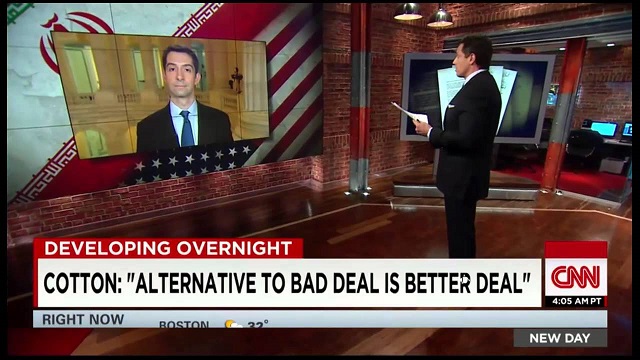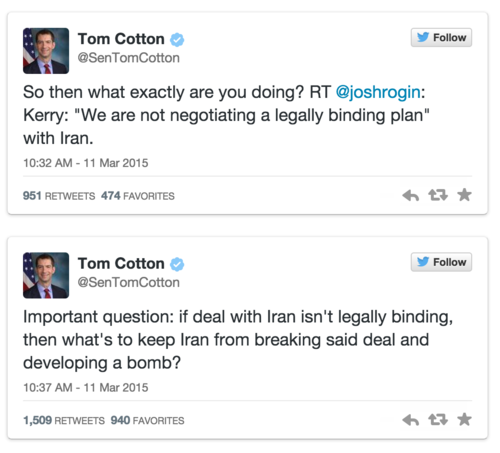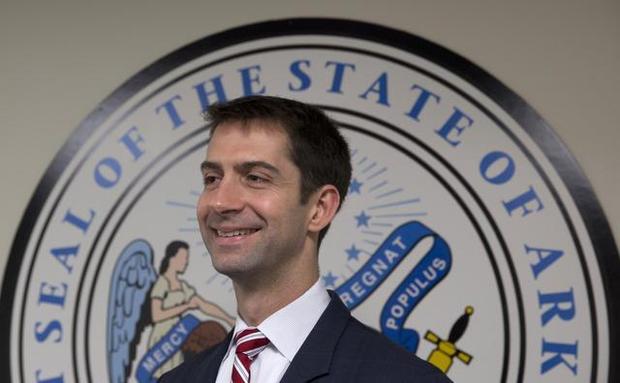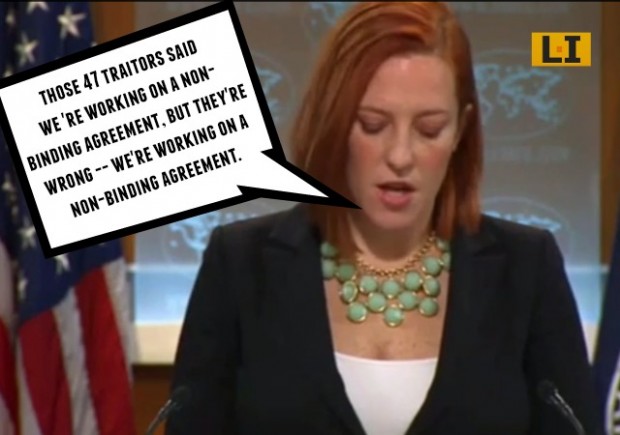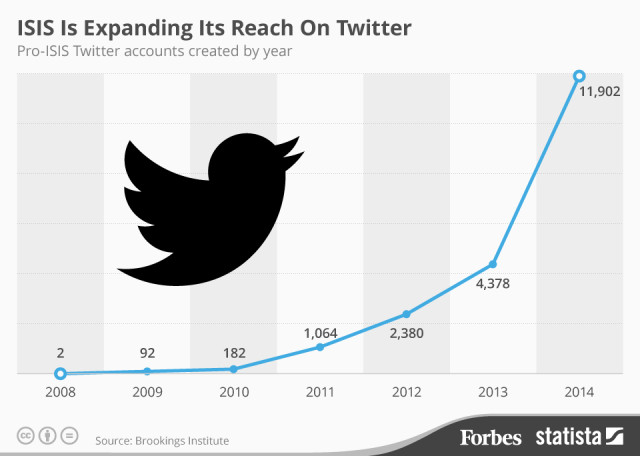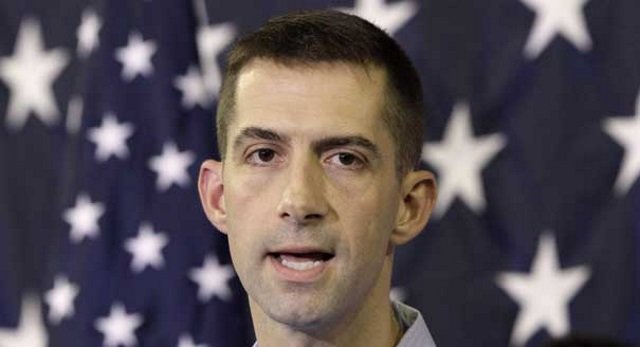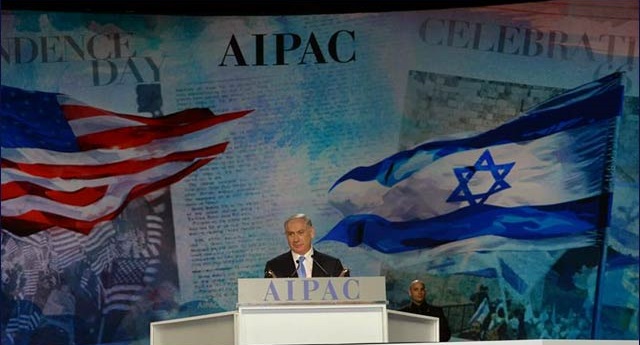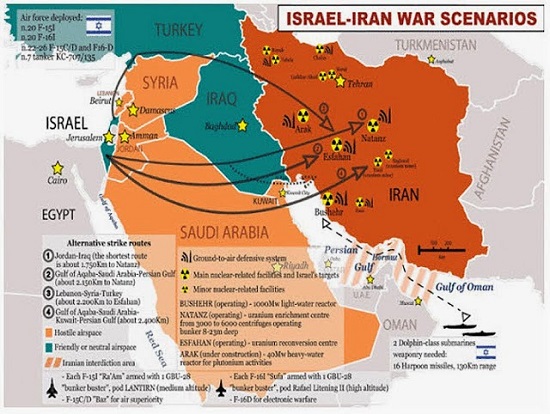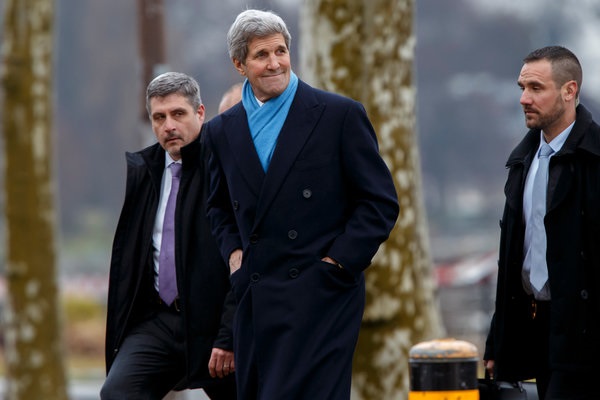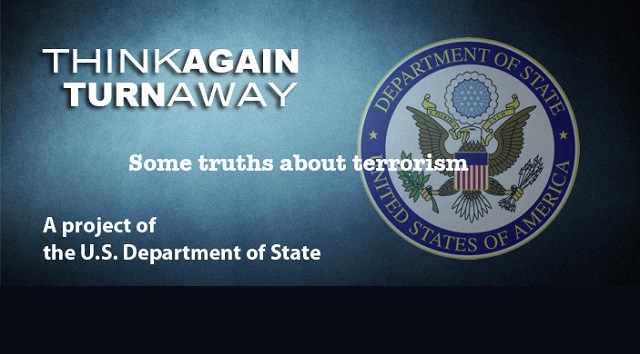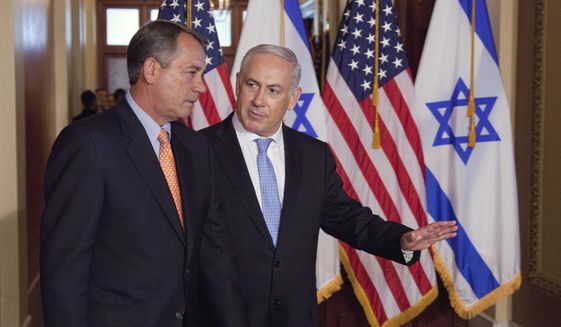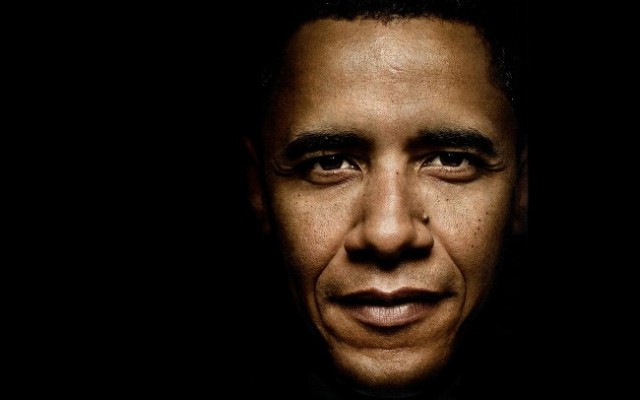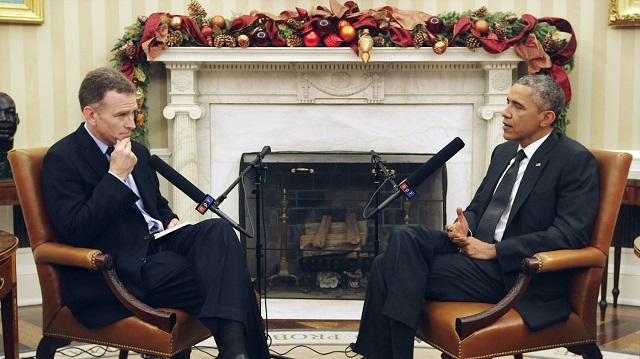Senator Cotton Defends Letter to the Leaders of the Islamic Republic of Iran
We posted several times this week on the controversy that erupted following publication of letter on Monday, March 9th, 2014, authored by Senator Tom Cotton (R-AK) and signed by 46 other Republican colleagues that was tweeted to the Leaders of the Islamic Republic of Iran. Seven Republican Senators for various reasons declined to do so. It drew the ire of the President, Secretary of State Kerry and most Democratic Senators. It triggered several White House website “We the People” website petition campaigns. One requested charges of “treason” be filed while the other accused Sen. Cotton and the 46 Republican signatories of violating the 1799 Logan Act suggesting they could be sued for illegally conducting foreign relations when Members of Congress are exempt from the hoary law. Further, both sides of the aisle have done so historically, including then Senators Kerry and Biden, House Minority Leader Nancy Pelosi and the late Sen. Ted Kennedy. That didn’t stop some media like the New York Daily News and others from suggesting Republican signatories of the Cotton Letter were acting in a traitorous manner in an editorial and front page headline, “GOPers Sabotage Bam Nuke Deal”.
The letter has been called “mutinous” by a former Army General cited by the Washington Post. Politico blamed Sen. Cotton for “getting us a hard-line Supreme Ruler.” President Obama found it “somewhat ironic” that the Cotton letter may have aligned them with so-called hardliner opposition in Iran to the nuclear deal. Others contended that the letter was “ misguided” and ”disrespectful” of the Presidential perogatives under our Constitution for negotiations of treaties and executive agreements. In our most recent post on the controversy on Friday, we wrote:
Two independent legal experts confirmed the Constitutional requirements for review of foreign treaties and Congressional executive agreements. Sen. Cotton’s letter also pointed out that any executive order signed by the President may not survive past the end of his term in 22 months and might be modified or terminated for cause by any successor. That raised a question of why the Memorandum of Understanding was non-binding. That provoked responses from both Foreign Minister Zarif and Supreme Ruler Ayatollah Khamenei. While the latter railed in rhetoric about how the GOP initiative reflected “the disintegration of the US” and why our representations can’t be trusted and laughing at the State Department citing Iran as a state sponsor of terrorism. It was left to Foreign Minister Zarif, to reveal that Congress wouldn’t have to approve anything saying: “The executive agreement was not bilateral but rather multi-lateral with the rest of the Permanent Members of the UN Security Council, plus Germany, subject to a resolution of the Security Council.”
Tzvi Ben-Gedalyahu wrote in a Jewish Press article published today, “U.N. Security Council’s lifting of sanctions and endorsement of a deal might make Congress irrelevant.” He then cites the observation of Omri Ceren, Communications Director for the Washington, DC-based The Israel Project:
The letter forced the Administration to explain why they’re icing Congress out of Iran negotiations, and now that explanation has ignited a firestorm. The administration looks like it intentionally chose a weaker, non-binding arrangement, rather than a treaty, to avoid Senate oversight.
Ken Timmerman, whose FrontPageMagazine article, we cited noted the reason for Zarif’s and presumably the Administration position:
The Obama administration has told Congress that it won’t submit the nuclear agreement with Iran for Congressional approval, but now Zarif is saying that it will be submitted to the United Nations, to form the basis of a United Nations Security Council resolution, presumably aimed at lifting UN sanctions on Iran.
That prompted Sen. Coker (R-TN) and Foreign Relations Senate Committee chair co-sponsor of The Iran Nuclear Agreement Review Act of 2015 to write President Obama Thursday:
There are now reports that your administration is contemplating taking an agreement, or aspects of it, to the United Nations Security Council for a vote.
Enabling the United Nations to consider an agreement or portions of it, while simultaneously threatening to veto legislation that would enable Congress to do the same, is a direct affront to the American people and seeks to undermine Congress’s appropriate role.
 Sen. Cotton was interviewed on Bill Bennett’s Morning in America program on Wednesday, March 11th, 2014 in the midst of the continuing controversy. He presented the salient background and rationale for the letter. Among points regarding his letter he made during the interview were:
Sen. Cotton was interviewed on Bill Bennett’s Morning in America program on Wednesday, March 11th, 2014 in the midst of the continuing controversy. He presented the salient background and rationale for the letter. Among points regarding his letter he made during the interview were:
He indicated that the letter took shape following Israeli Prime Minister Netanyahu’s address to a Joint Meeting of Congress that, in his opinion, raised questions about what sort of deal the Administration was entering into among both his Republican and many Democratic colleagues, as it did not preclude Iran from achieving a nuclear capability.
His letter was directed at informing Iran’s leaders of the Constitutional authorities for Senate review of foreign treaties and executive agreements and that they may be terminated by end of President Obama’s term or modified by succeeding Presidents or Congress under existing related sanctions legislation. He thought that the response from Iran’s foreign minister reflected his lack of understanding of Congressional review and ratification requirements as regarding any Memorandum of Understanding on Iran’s nuclear program that the US P5+1 might enter into.
He illustrated the ability of President to rescind executive agreements of predecessors with reference to the 2004 letter of former President Bush to the late Israeli Prime Minister Ariel Sharon reaffirming Israel’s rights under UN Resolution 242 to “secure and defensible” borders and that Jerusalem was Israel’s undivided capital. President Obama, according to Sen. Cotton, rescinded that executive agreement by suggesting that Israel might divide Jerusalem along the lines of the pre-1967 1949 Armistice Line.
The President’s objective, endeavoring to conclude so-called verifiable agreements on Iran’s nuclear agreements in their current form, would be a bad deal as reflecting in Israeli Prime Minister’s address comments before a Joint Meeting of Congress on March 3rd as it could allow Iran to continue developing a nuclear capability, not preclude it.
He suggested that President Obama’s motivation for pushing for the Iran nuclear deal was to achieve a strategic rapprochement with Iran. This despite the Islamic Republic cited by our State Department as a state sponsor of terrorism. Among specific examples cite by Cotton during the interview were the 1979 US Embassy hostage taking and terrorist attacks by proxies over several decades that resulted in deaths and injuries to hundreds of American diplomats and service personnel in Lebanon, Iraq, Saudi Arabia and Afghanistan.
On the Matter of the Administration’s new Authorization for the Use of Military Power submitted to the Senate, he called it seriously restrictive. He pointed to the collapse of Iraq and rise of the Islamic State following the Administration’s failure to conclude a status of forces agreement with Iraq on the termination of the Iraq War in 2011.
When asked about Iran’s involvement in the current battle for Tikrit with Iraq national security forces and Iranian controlled Shia Militia, Cotton noted the role of the Quds Force, a combination of Special Forces and its CIA and its ubiquitous commander Qassem Suleymani. He accused Suleymani’s Quds Force of involvement in American casualties in both the Iraq and Afghanistan Wars. It also reflected Iran’s rapidly expanding sphere of influence over four Arab countries in Lebanon, Syria, Iraq and more recently, Yemen.
Sen. Cotton’s Bennett program interview came just before revelations about the implications of Foreign Minister Zarif’s remarks suggesting the non-binding Memo of Understanding reflected resort to UN approval of any appraisal arising from the multilateral negotiations with the P5+1. You may listen to the Bennett interview with Sen. Cotton, here.
EDITORS NOTE: This column originally appeared in the New English Review. The featured image is courtesy of CNN.

